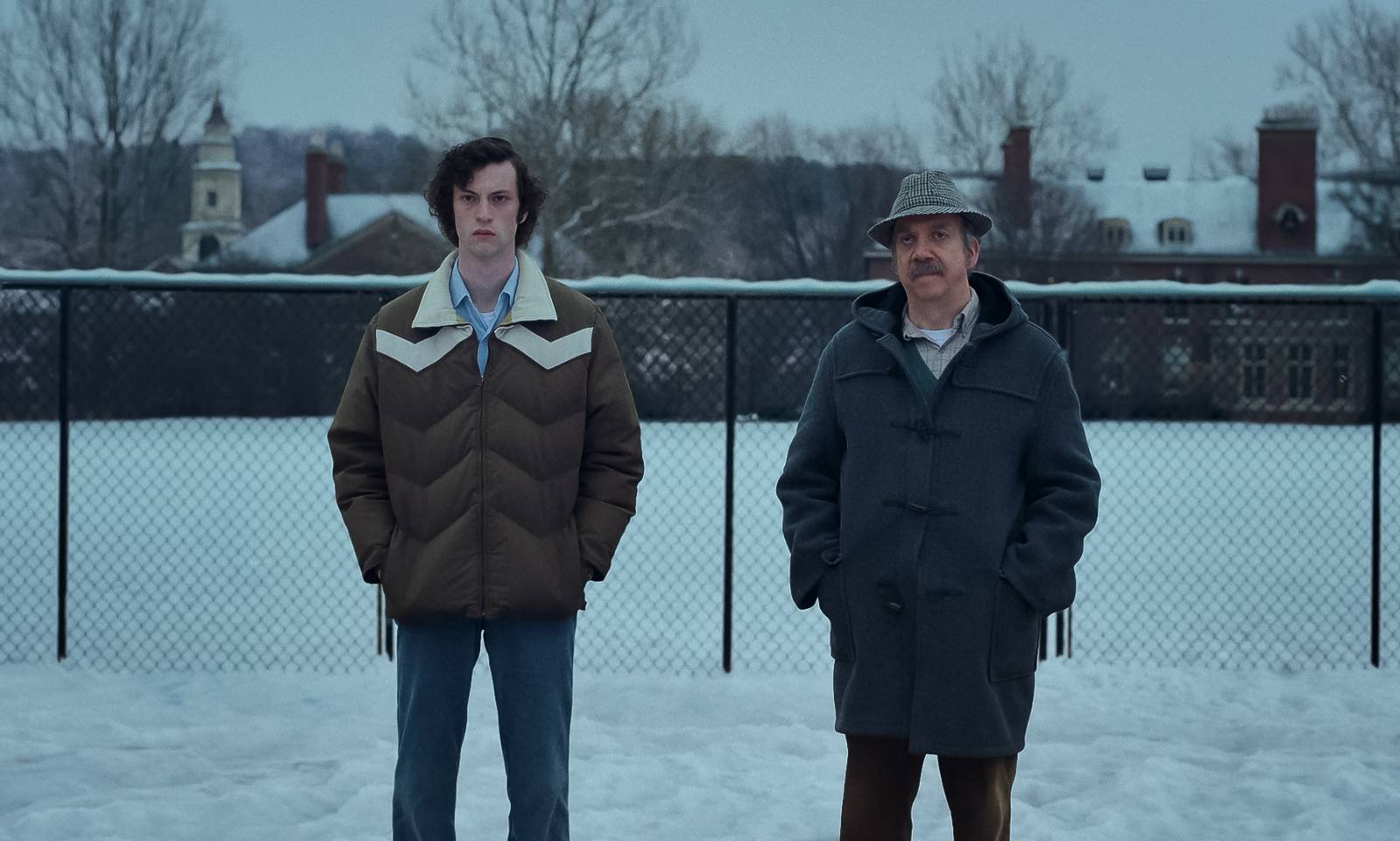
TIFF Review: The Holdovers is a Heavily Nostalgic, Likable Return for Alexander Payne
In the midst of a festival setting, catching up with all the best of world cinema and the contemporary avant-garde, you basically hope––sometimes even luckily have––your notion of the moving image genuinely challenged. So you might forget what it’s like to engage with a well-made “nice and normal” movie that frankly works. Basically exactly what you would expect, Alexander Payne’s newest film The Holdovers, directed from a script not written by him––the signs of a good-behavior assignment to make up the critical and commercial failure of his ambitious passion project Downsizing––lives up that notion.
A heavily nostalgic project scored to non-stop Cat Stevens and featuring retro production logos, it blatantly positions itself in the “they don’t make movies like this anymore” camp, recalling Hal Ashby and his ilk’s character-driven dramedies of the ’70s. In fact, its retro appeal went so far I initially couldn’t tell if the muffled dialogue was supposed to pay tribute to mono sound or was just a failure of the speakers.
The Holdovers is set in December 1970 at a New England boarding school known for its “rich but dumb” student body, largely the sons of CEOs and congressmen who will go on to prestigious universities and jobs despite their lack of any value. The school’s ancient history teacher, the grumpy Paul Hunham (Paul Giamatti), is hilariously introduced marking his students’ papers with utter contempt, muttering one “philistine” after another.
Like a tulpa of Miles from the earlier Payne-Giamatti collaboration, Sideways, there’s a seeming continual interest from the duo in exploring a certain kind of western man not portrayed in that many movies: the snobbish geek who could only exist within certain conditions of a comfortable, gloating American empire. He’s obsessed with virtually everything before the common era, and someone unable to not raise his interests in any conversation, no matter the person he’s talking to––including the number of women who trigger his romantic insecurity.
Paul’s resentment runs deep; he has to reign himself in when ruffling the feathers of the school’s biggest donor by failing his son. Seemingly a bit of stand-in for some of the late-boomer / early-Gen X liberal dissatisfaction and inaction in the face of the powers that be, the hapless teacher can’t help but do nothing about his ineffectiveness in the face of the country’s ever-continuing power structure.
Paul is not heartless, though, as seen through his sometimes bordering on condescendingly respectful rapport with Mary (Da’Vine Joy Randolph), the school’s head cook who’s reeling from the death of her son in Vietnam. The intersection of race, gender, and class certainly exists (something that counters the film’s potentially reactionary dips into cozy ’70s nostalgia) within her placement in the all-white, all-male, all-rich school.
The drama starts over Christmas break, the intelligent but misbehaving misfit Tully (Dominic Sessa) left behind when his mother wants the holiday alone with her new husband. From here the three outcasts form a bond, even if it’ll take a good portion of the 133-minute runtime to happen.
The teen-rebel character is not the typical young, dumb lout (say of the Chris Klein variety) found in other Payne films like Election or The Descendants. The tension between Paul and Tully is how their respective insecurities manifest through different age brackets. And The Holdovers’ true surprise is the performance from first-time actor Sessa. Much as it pains me to admit that a Zoomer actor can have gravitas, this novice holds his own against a top-form Giamatti, never resorting to showy young-actor intensity for his character’s anxious personality.
Admittedly, a big fault is that during almost every scene of The Holdovers’ final 45 minutes I thought the film was ending. The characters are continually nice company, even if it does begin to feel like the film has wrung all it can out of them until their arcs reach inevitable conclusions. Tully’s journey isn’t as compelling as Paul’s, if perhaps because he’s, at the end of the day, more of a device to help the latter realize something about himself.
Yet for how it captures the ambiance of walking out of a liquor store and down a wintry street a few days after Christmas, The Holdovers makes for the ideal annual holiday revisit. If far from revelatory, it nonetheless contains a good deal of likability and honesty.
The Holdovers screened at the 2023 Toronto International Film Festival and arrives in theaters on October 27.
Grade: B










































![iFi's GO Bar Kensei Dongle DAC Supports K2HD Technology With Some Samurai Swagger [Updated] iFi's GO Bar Kensei Dongle DAC Supports K2HD Technology With Some Samurai Swagger [Updated]](https://i0.wp.com/cdn.ecoustics.com/db0/wblob/17BA35E873D594/33FF/45A11/QTXOLJR4xDKSNMMk2WlTgjaIlvSgcYpeU1xJzUwIoYs/ifi-go-bar-kensei.jpg?w=768&ssl=1)































